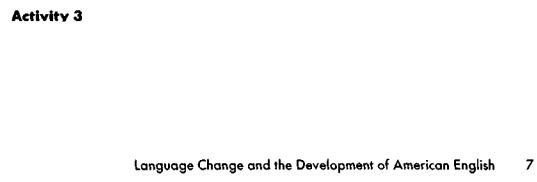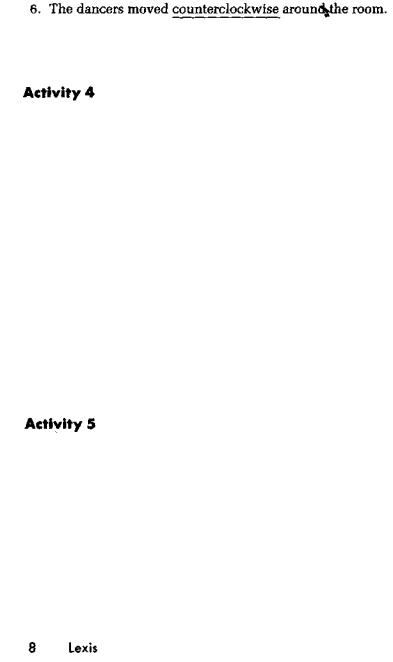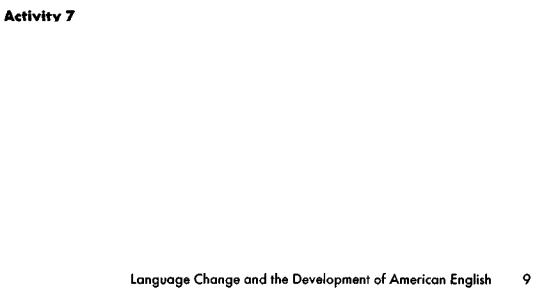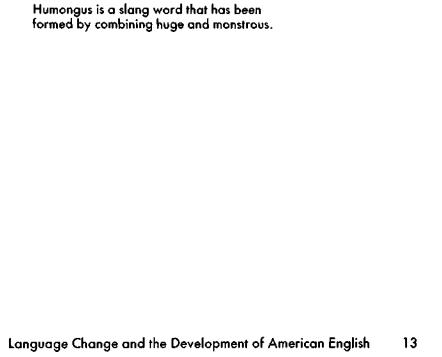
Lexis
.pdfarticle. If you cannot understand the meaning of a sentence, use a dictionary to look up key words.
1.Scientists theorize that language evolved as early humans used sounds to symbolize objects, people, and needs.
2.Language change can reflect knowledge that is added to the human storehouse of information.
3.When the French-Normans conquered England, English became the language of the ruling class.
4.The Greeks contributed many words to the English language, especially in the areas of government, schools, and church.
5.As French words supplemented the English language, a richness of synonyms resulted.
6.Thomas Jefferson started a crusade to reform the spelling system of American English.
7.Early Americans adopted the Indian names for animals that had no counterparts in England.
8.The inconsistency between spelling and pronunciation can be partially explained by the fact that the spoken word evolved constantly, while the printed language remained more fixed.
9.The tendency to change brand-name products into generic words accounts for new words like Kleenex.
10.English vocabulary has constantly expanded as a result of the impact made by a multilingual population.
UNDERSTANDING WORDS
Vocabulary List
|
|
|
Adjectives/ |
|
Verbs |
|
Nouns |
Participles |
Adverbials |
account (for) |
occupy |
counterpart |
classic |
constantly |
conquer |
progress |
crusade |
enormous |
partially |
consider |
reflect |
descendant |
generic |
respectively |
contribute |
reform |
impact |
|
|
deal (with) |
represent |
inconsistency |
|
|
dominate |
supplement |
richness |
|
|
evolve |
symbolize |
tendency |
|
|
expand |
theorize |
|
|
|
form |
trace |
|
|
|
Subject-Specific Vocabulary |
• |
|
Nouns: dialect, suffix, synonym. |
Adjective: multilingual. |
|
Language Change and the Development of American English |
5 |
|

This book will help you learn specific words and will also help you become a word learner. People learn a word in two general ways: through experience and through the use of a dictionary. In this book you will learn the new words by using them repeatedly in a variety of activities. The book will also give you practice using the dictionary to clarify word meanings.
When you read a word you do not know, follow these steps:
1. Ask yourself if you really need to know the word in order to understand the sentence. In which of the following sentences is the meaning of the underlined word important to the general meaning of the sentence?
The little boy sat under a banyan tree, dreaming of the day when he would be big enough to work with the men.
Benjamin Franklin was known for his frugality.
In the first sentence, the main idea concerns the little boy's thoughts about the future. Where he was sitting is not critical to the meaning of the sentence, so you can understand the sentence without knowing the details about a banyan tree. In the second sentence, frugality contains the main idea of the sentence. Without it you do not know what Benjamin Franklin is known for.
2. If you do need to know the word, look for context clues. Following are five different kinds of context clues that will help you guess the meaning of the words.
a. Synonym or restatement clues
It is difficult to find a pristine, or unspoiled, forest in the United States.
b. Comparison or contrast clues
Although Harold is very loquacious, his wife is very quiet.
с Example clues
The student procrastinated starting his homework. He washed his car, telephoned a friend, watched television, and finally started studying at midnight.
d. Experience or situation clues
The young woman packed her clothes in a valise and hurried to the airport.
e. Direct explanation or summary clues
The computer science student was successful because of his tenacity; that is, he was determined to understand how to write a program, and he continued to work until he wrote one successfully.
3.If you can't guess the meaning of the word from the context, look at the word itself and see if you can break it into parts that have meaning. For example:
im polite ness |
re occur ence |
4. If you still don't know the word, look it up in the dictionary.

Read each sentence or group of sentences carefully. Then use the context clues to guess the meaning of the underlined word.
1.Switzerland is a multilingual nation. Its residents speak French, German, and Italian.
2.Alaska is an enormous state. Rhode Island, on the other hand, is very small.
3.Since the American flag is meant to symbolize, or represent, the unity and the history of the nation, it is displayed in front of government buildings.
4.Shakespeare's plays have had lasting significance and value in the world of literature. Such classics are greatly valued by English-speaking people.
5.The rich family contributed two million dollars to the museum.
6.The governor wants to keep the university scholarship program the same as it has been for fifty years, but his opponents are hoping to reform it.
7.George Washington and his wife had no children, so this famous president had no descendants.
Activity 2
A word can have several meanings. You have to look at the way the word is used in a sentence in order to understand its meaning. Often you will find clues to the meaning in the original sentence or in surrounding sentences. Study this example.
The creator of the atom bomb reflected on, or thought about, the effect it would have on humans and the future of the world.
The words "thought about" tell what reflected means. This is a context clue. In the following sentences, identify the clues that help you understand the use of reflect.
1.The child saw her face reflected in the mirror.
2.Language reflects change in society. For example, computer-related words recently added to the language show the importance of computers.
3.Some people think that the behavior of a child reflects on the parents. If the child behaves badly, the parents are to blame or are responsible.
4.Light colors reflect heat, but dark colors absorb heat instead of throwing it back.
Sometimes knowing the meaning of parts of words will help you understand the word without looking in the dictionary. For example the prefix preat the beginning of a word often means "before." Remeans "again." What do the underlined words mean in these sentences?
1.The manager attended a premeeting luncheon.
2.Halley's Comet reappears approximately every 75 years.

3.Many people have tried to reform the English spelling system.
4.People who prepay their hotel bills may get a discount.
The prefix counterhas several meanings. Look for this prefix in your dictionary, then tell what the underlined words mean.
5.The U.S. president met with his British counterpart to discuss a new trade agreement.
7.Aware that he was losing the game, the brilliant chess player planned a clever counterattack.
If you are unable to find a certain word in the dictionary, breaking the word into parts may help you find it. The main part of the word is called the "root" or "base." A part added before the base is a prefix, and a part added after the base is a suffix. For example:
preoccupation |
(pre |
+ occupy + ation) |
|
|
prefix |
+ base |
+ suffix |
A word with a prefix or a suffix may sometimes be found as a main entry in a dictionary, or it may be found with the entry for the base word. For example, the word prepay may not be in the dictionary, so look for pay. The words greatness and liveliness can be found under great and lively, respectively. Thus, words with suffixes such as -able, -er, -less, -like, -ly, and -ation may be found in a dictionary under the base word entry.
Look up these words in your dictionary. If a word does not appear as a main entry, where can you find it?
unrepresentative |
disregard |
lifelike |
sensationally |
progressively |
indigestible |
multilingual |
"^unforeseeable |
conqueror |
inconsistency |
realistic |
visionary |
Words that are similar in meaning are synonyms, and those that are opposite in meaning are antonyms. To understand the meaning of a word, sometimes it helps to know its opposite. Which of the following pairs of words are antonyms, and which are synonyms?
tendency/likelihood |
constantly/seldomly |
counterpart/opposite |
expand/contract |
partially/completely |
multilingual/monolingual |
occupy/inhabit |
supplement/add to |
consistency/inconsistency |
trace/follow |
|
|

Which word or group of words has the same meaning as the underlined word in each sentence?
1. The committee chairman had to account for how the money was spent.
explain |
decide |
add up |
find out |
2.America as a union of 50 states expanded from the colonies along the Atlantic Coast.
governed changed grew started
3. A new language, "computerese" or "computer talk," was formed with the development of the personal computer.
used created spoken written
4. To many immigrants, the Statue of Liberty symbolizes freedom.
leads to |
helps |
lives in |
represents |
5. Scientists theorize that humans are descendants of apes.
explain believe argue prove
6. Some psychologists believe that television has an impact on children, mostly negative.
understanding outcome effect interest
7. The majority party got the most votes; respectively, the conservative candidate got 40 percent, and the radical candidate got 60 percent.
surprisingly only easily individually
8. She carefully considered the matter before she made the decision to marry the prince.
- talked about |
described |
learned about |
thought about |
Main entries in a dictionary may have more than one part of speech, for example, adjective (ADJ), noun (N), verb (v), adverb (ADVJ, preposition (PREP). Identify the underlined words below as nouns, verbs, adjectives, or adverbials.
1.He stopped the car suddenly.
2.She jumped higher than ever before.
3.You look nice in your new suit.
4.The student's progress was impressive.
5.They considered the options carefully.
-6. To apply for the college, I had to fill out many forms.
7.The project is progressing on schedule.
8.My friend always dominates the conversation.

9.The Christians led a crusade to expand their religion.
10.People often supplement their diets with vitamin pills.
11.The detective traced the criminal's activities to the source of the crime.
12.The police chief crusaded against crime.
In a dictionary, verbs may be identified as VT or VI. VT means "verb transitive"—the verb must be followed by an object. VI means "verb intransitive"—no object is used after the verb. Some verbs may be either transitive or intransitive. Look at the following sentences. (For an explanation of what the symbols s, V, and О represent, see the glossary at the end of the book.)
s |
у |
о |
The horse carried a rider. (Carry is always transitive.) |
||
s |
v |
|
The horse slept standing up. (Sleep is always intransitive.) |
||
S |
V |
О |
The horse kicked the barn door. |
||
S |
v |
{Kick is transitive or intransitive.) |
The horse kicked violently.
Read each sentence below. If the verb is transitive, add an object after the verb. If the verb is intransitive, add nothing. If the verb is both transitive and intransitive, write it or say it both ways. For example, speak can be both transitive and intransitive.
She spoke |
with a slight accent. |
|
|
||
|
|
|
|
|
|
She spoke English with a slight accent. |
|
|
|||
She spoke with a slight accent. |
|
|
|||
1. Many languages have contributed |
|
to the English language. |
|||
|
|
|
|
|
|
2. People learning English as a second language may have difficulty dealing with
|
|
|
at first. |
|
|
|
|
|
|
|
|
|||
3. |
Like English, other languages have evolved |
|
|
|
over many centuries. |
|||||||||
|
|
|
|
|
|
|
|
|
|
|
|
|
||
4. |
The Angles, Saxons, and Jutes occupied |
|
|
|
hundreds of years ago. |
|||||||||
|
|
|
|
|
|
|
|
|
|
|
|
|||
5. |
H2O symbolizes |
|
|
|
|
in chemistry. |
||||||||
|
|
|
|
|
|
|
|
|||||||
6. |
The Normans conquered |
|
|
|
|
in 1066. |
||||||||
|
|
|
|
|
|
|
|
|
|
|||||
7. |
Americans consider |
|
|
|
difficult to learn. |
|||||||||
|
|
|
|
|
|
|
|
|
|
|||||
8. |
Lexicographers can trace |
|
|
|
|
to their earlier forms. |
||||||||
|
|
|
|
|
|
|
|
|
|
|
||||
9. |
Musicians constantly practice |
|
|
|
|
|
|
|
|
|||||
10 |
Lexis |
|
|
|
|
|
|
|
|
|||||

Activity 9
Words that are the same in spelling but are different in meaning and origin are often listed as separate entries in a dictionary. An entry may have several definitions. For example:
deal1 |
vt. |
dealt, dealing 1. to give out or distribute |
2. to administer, give or de- |
liver |
n. |
1. the giving out of cards in a card game |
2. a business arrangement or |
transaction Colloq.* treatment—good or bad [a fair deal, a dirty deal] |
|||
deal2 |
n. a quantity or degree of something, usually a large amount |
||
deal with vi. 1. to do business with someone or trade in something 2. to be about something (subject matter) 3. to behave in a certain way toward others
reform1 vt. 1. to cause to improve, make better or right vi. to improve one's behavior
reform2 vt. to form again
In the sentences below, write the entry that reflects the meaning of the underlined words. The first one has been done for you.
1. The college student had a great deal of trouble with his calculus class.
a large amount
2.The study of linguistics deals with the history of language and language change.
3.The two companies made a deal to exchange manufacturing methods.
4.It takes patience to deal with small children.
5.In England, numerous attempts were made to reform the spelling system.
6.The potter disliked the first shape of the bowl, so he reformed it.
7.After the prisoner was released, he promised to reform.
Activity 10
Look up the following underlined words in your dictionary and write the definition that fits the meaning of the word as it is used in the sentence.
1.They conquered their fear of flying by participating in group therapy.
2.The Incas of Peru were conquered by the Spaniards.
*For an explanation of colloq., see colloquialism in the glossary.
Language Change and the Development of American English |
11 |

3.As the western frontier in America expanded, the American language changed, adding new words that reflected the new environment.
4.Iron expands when it is heated.
5.The English language was influenced by the various nations that occupied England prior to the 12th century.
6.The student had little free time because he was occupied with his homework.
7.My office seems crowded because the books occupy so much space.
8.I couldn't stay at the hotel because all of the rooms were occupied.
9.He didn't seem to understand me. I think he was mentally preoccupied.
Activity 11
Which of the following meanings for contribute fit the sentences below?
1.to share or participate in; to give something
2.to write an article, as for a magazine
3.to furnish ideas
4.to help in bringing about
Norman Vincent Peale contributes a column in several newspapers. Cigarette smoking contributed to his poor health.
We all contributed money to the Emergency Relief Fund.
Each member of the discussion group contributed.
Activity 12
Rich and wealthy are synonyms and are interchangeable. Richness and wealth have similar meanings but are not always interchangeable. When referring to money, only wealth can be used, but when referring to the quality of something, either can be used.
In which sentences below is richness correctly used? In sentences where it is incorrectly used, make the sentence correct.
1.Butter added to the richness of the cake.
2.The richness of the soil was apparent in its dark color.
3.The richness of the king was evident from his jewels.
4.I liked the fabric because of its richness.
5.His fancy car was a symbol of his richness.
Activity 13
A dialect is a variety of a language spoken in different parts of a country or in another country, such as British English and American English. Words from the same language are often pronounced differently by region or country, and there may be differences in
12 Lexis

vocabulary use. For example, look in your dictionary for the pronunciation of aunt. Which pronunciation do you hear where you live?
Some dictionaries list British and American spellings of the same word. See if these British words are in your dictionary. What is the American counterpart of each?
lift (noun) |
flat (noun) |
theatre |
cheque |
lorry |
bonnet (car part) |
colour |
defence |
Activity 14
Look up the word classic in your dictionary. Tell what the word means in each of these sentences and whether it is being used as a noun or an adjective.
1.Michelangelo was an architect and poet, but he is best known as a classic painter and sculptor.
2.Elizabeth is a graduate student in English, specializing in the classics.
3.Gone with the Wind is an American classic in literature and in cinema.
4.Gary's 1955 Porsche is valued as a classic by car collectors.
5.Oscar De La Renta has consistently designed clothes in a classic style.
6.Bob Hope is a classic example of a comedian.
Activity 15
The noun form of enormous is enormity. Some synonyms for enormous are gigantic, monstrous, huge, and vast. What are the noun forms for these words?
Activity 16
Constantly refers to doing something without stopping or doing something frequently over an extended period of time. Which of the following do you do constantly?
make spelling mistakes |
forget to pay bills |
smoke too much |
bite your fingernails |
drive too fast |
diet |
Activity 17
Which of the statements below are only partially true, according to the article?
1.Benjamin Franklin and Noah Webster were champions of language reform in early America.
2.French, German, Latin, and Chinese have all contributed enormously to the English language.

3. American English adopted words such as man, wife, and house from the native Indian languages.
4. Some English verbs resisted change; they are now considered regular verbs.
Activity18
Xerox has become a generic term for photocopying.
I have to xerox some papers.
1. |
zipper |
a. |
a drug for headaches |
2. |
aspirin |
b. |
a soft drink |
3. |
Kleenex |
с |
denim pants |
4. |
Levis |
d. |
a facial tissue |
5. |
Coca-Cola |
e. |
gelatin |
6. |
Jello |
f. |
a fastener on pants oi |
Activity19
The title of this book, Lexis, is a Greek word. Look in your dictionary for the origin of the word—its etymology. If you can't find it as a main entry, what can you look under? What does it mean? What do these words mean?
lexicon lexicography lexicographer
Activity 20
Discuss the following questions in pairs or small groups.
1. What language dominates in each of these countries? |
|
|
|||
Brazil |
Canada |
Panama |
the Philippines |
Vietnam |
India |
2.The prefix multimeans "many." What does it mean if a person is a multimillionaire? What if a business is multinational?
3.What do these represent?
1. A.D. |
4. |
M.A. |
7. RSVP |
10. etc. |
|
2. B.C. |
5. |
Ph.D |
8. |
IOU |
11. i.e. |
3. A.M. |
6. |
M.D. |
9. |
c/o |
• 12. e.g. |
4.If two things or actions are inconsistent with each other, they are not in harmony or agreement. Which of the following actions represent an inconsistency in behavior?
a.dieting/eating donuts for breakfast
b.being a good student/studying daily
c.opposing the use of hand guns/going hunting with rifles
d.having a concern for the environment/recycling aluminum cans
14 Lexis
